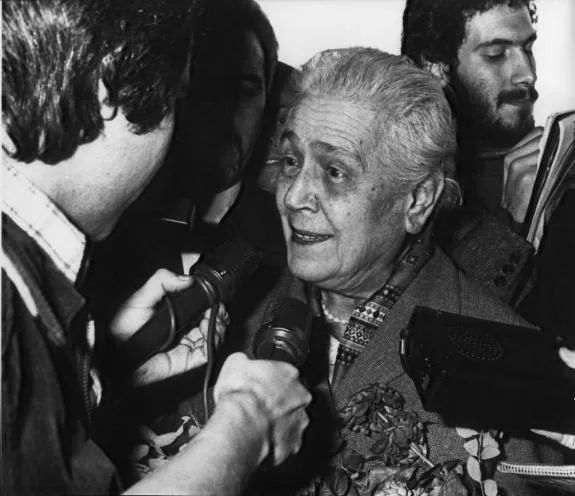

Secciones
Servicios
Destacamos

LIZ PARRY / RACHEL HAYNES
Friday, 11 October 2019, 16:13
On 11 October 1977 the press gathered at Madrid's Barajas Airport to meet one very special passenger. After nearly four decades in exile, Malaga-born Victoria Kent set foot once again on Spanish soil.
On arrival the former lawyer and politician, who was well known for having been Director General of Spanish Prisons during the Second Republic and for fighting for the rights of victims of the Franco regime from exile, called for a general amnesty that would benefit all prisoners, even common criminals.
She told the press that the process to bring democracy back to the country had lacked freedom and that in her opinion the most recent elections lacked validity.
Victoria Kent was born into to a liberal Irish-Italian family in Malaga at the end of the 19th century (different sources put her birth year at 1897, 1898 or even 1891). She was sent to Madrid to study Law and became the first woman to be called to the bar and the first to argue a case before the Supreme War Tribunal. She was Director General of Prisons between 1931 and 1933.
During Kent's stay in Madrid in 1977, the newspaper El País reported that she addressed a group of around 40 lawyers at a dinner held to exchange opinions on the prison system prior to a much-needed penal reform. Kent During her time as Director of Prisons, Kent carried out reforms to improve conditions in and defended the rehabilitation of criminals.
In 1931 Kent had also become one of the first three women to be elected to the Cortes, entering the constituent assembly, charged with writing a constitution for the new Spanish Republic as a Radical Socialist.
It was here that her story takes an unexpected turn, as she argued fiercely against allowing women to have the vote. Her reasoning was that women needed to be better education before they got the suffrage, the danger being that the largely uneducated female population would just vote as Catholic priests instructed them.
During the Civil War Kent worked in the defence of Madrid before leaving Spain when she was appointed ambassador in Paris by the republican government.
She lived in Paris until 1947, when she moved to Mexico and later to New York.
Despite being welcomed warmly by her followers on her return in 1977, she did not stay long in Madrid. She returned to New York where she died ten years later.
Publicidad
Publicidad
Publicidad
Publicidad
Esta funcionalidad es exclusiva para registrados.
Reporta un error en esta noticia

Debido a un error no hemos podido dar de alta tu suscripción.
Por favor, ponte en contacto con Atención al Cliente.

¡Bienvenido a SURINENGLISH!

Tu suscripción con Google se ha realizado correctamente, pero ya tenías otra suscripción activa en SURINENGLISH.
Déjanos tus datos y nos pondremos en contacto contigo para analizar tu caso

¡Tu suscripción con Google se ha realizado correctamente!
La compra se ha asociado al siguiente email
Comentar es una ventaja exclusiva para registrados
¿Ya eres registrado?
Inicia sesiónNecesitas ser suscriptor para poder votar.